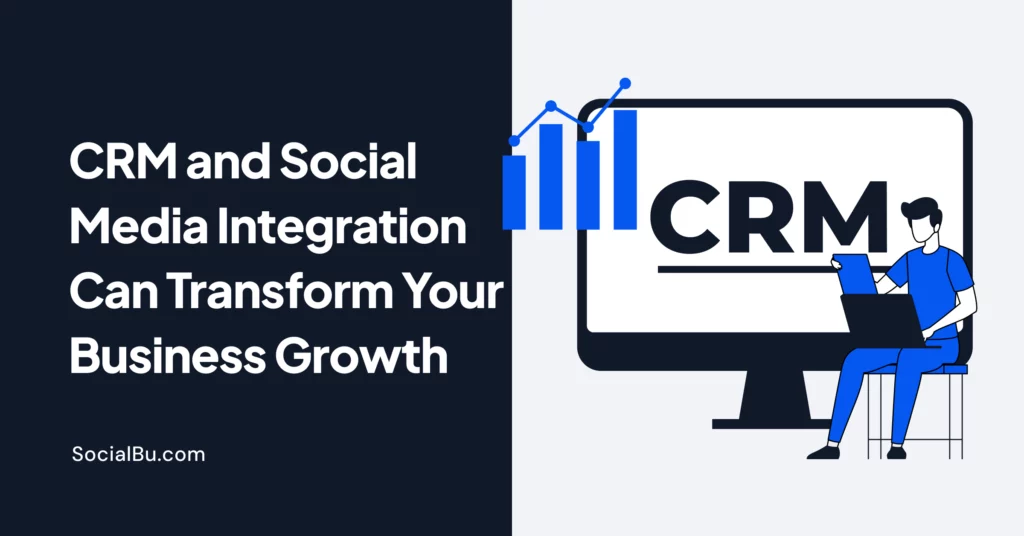Managing customer interactions across multiple social platforms can become overwhelming as your business expands. A sound CRM system enables your social media team to track customer interactions across Facebook, Instagram, Twitter, and LinkedIn, while organizing all your contacts in a centralized location. In today’s digital landscape, businesses need CRM and social media integration to build stronger connections and enhance the customer experience by providing better visibility into every customer journey across all touchpoints.
This article explains what a CRM is, how it works with social media platforms, and why integrating CRM and social media helps support business success. You’ll also learn how to select the right tool, launch with confidence, and refine your social media marketing results over time.
What is CRM in the Context of Social Media Marketing
CRM is a set of tools and practices used to manage customer relationships with both prospects and clients across all channels, including social media platforms. A CRM system stores key details, such as names, email addresses, phone numbers, social media handles, and engagement histories from your social campaigns, all in a single, centralized location.
With this information at your fingertips, your social media team can send the right message at the right time to meet specific customer needs on their preferred platform.
A modern business CRM does more than just store contacts; it also enables seamless collaboration between your social media managers and sales teams. It can automate routine tasks, such as responding to social media comments, scoring leads based on social engagement, and providing analytics and reporting from your social campaigns.
These features provide teams with actionable insights, enabling them to focus on high-impact social media activities that support business goals and drive overall growth and efficiency.
How CRM Works with Social Media Platforms
A typical CRM platform integrates with your website, email system, sales tools, and crucially, your social media accounts. Every time a visitor likes your Instagram post, comments on Facebook, or clicks on a Twitter link, your CRM records the activity.
Your team receives real-time updates for each customer record, including their social media interactions and activity. You can then categorize contacts based on their social behavior, send targeted offers through their preferred social channels, and follow up with leads as soon as they show interest through social engagement.
Behind the scenes, the CRM software consolidates data from all channels, including social media platforms, into a single view. This unified approach enables accurate CRM data analysis, allowing social media managers, sales representatives, marketers, and support agents to make more informed decisions about their social media strategy. That consistency fosters trust and reduces errors across your social media campaigns.
Top Benefits of CRM and Social Media Integration for Your Team
Implementing CRM and social media integration delivers clear gains across social media marketing, sales, and support. Here are the key wins you can expect:
- Improved visibility into customer behavior across social platforms
- Faster response times for social media inquiries and comments
- Consistent messaging across all social channels
- Clear assignment of social media tasks and follow-up actions
- Shared calendar and task list for all social media team members
- Automated reminders for key social media campaign milestones
- Centralized document and file storage for social media assets
Boosting Sales and Marketing Through Social Media CRM
A CRM guarantees that no social media leads are overlooked. Your marketing team can track which social media campaigns generate the most interest and engagement. Social media managers can see which prospects opened direct messages, clicked social media links, or engaged with specific posts.
With these insights, your team can focus on high-value social media opportunities and close deals more quickly.
Using CRM and social media data, you can create personalized social media content sequences and track engagement rates across platforms. That feedback loop demonstrates which social media posts, stories, and calls to action are most effective.
Over time, you refine your social media outreach and increase conversions from social channels.
Enhancing Customer Service Through Social Media
Support teams use CRM to log social media tickets, track resolution steps for social media complaints, and identify common issues arising from social platforms. This feature enables your team to address social media concerns before they escalate into public relations problems.
Customers feel heard and valued when you respond promptly to their social media messages and provide context for their past interactions across all platforms.
Many CRMs allow you to create a knowledge base and include social media chat or help desk functionality. Social media agents save time by linking to existing articles and updating tickets within the system when responding to social comments or messages.
The process eliminates manual handoffs while meeting customer expectations for fast social media service.
Using Data to Drive Social Media Decisions
Your CRM database contains valuable information about social media. You can use social media trends to improve your strategy. For example, you may discover that the majority of new clients are engaging with your content on Instagram rather than Facebook, or that LinkedIn generates higher-quality leads. You can then target your social media outreach to those platforms.
To ensure the accuracy of your social media database, utilize data enrichment services to fill in missing social media handles and verify contact information from social platforms. This approach enables you to contact the right person on the right social platform, avoiding time wasted on outdated social media profiles or inactive accounts.
Key CRM Features to Look For in Social Media Integration
When you shop for a CRM with social media capabilities, check that it offers these essentials:
- Contact management with custom fields for social media handles
- Lead scoring to rank prospects by social media activity
- Task and calendar tools for social media follow-up scheduling
- Reporting dashboards with visual charts for social media metrics
- Workflow automation to handle routine social media tasks
- Mobile app for social media access on the go
- Native social media platform integrations
Each feature saves time and reduces mistakes in your social media management. You can add more advanced social media functions later as your needs grow.
Social Media Integration Strategies
A CRM works best when it shares data with your social media tools and other platforms. Plan to connect these systems:
- Social media management platforms like SocialBu for content scheduling
- Social media advertising platforms for campaign tracking
- Calendar for social media content planning and scheduling
- E-commerce store for purchase history from social referrals
- Social media analytics tools for engagement data
- Email marketing platforms for cross-channel campaigns
Most modern CRMs offer built-in social media connectors or simple plugins. Set these up early to avoid manual exports and imports of social media data.
Steps to Choose the Right CRM System for Social Media
Follow these steps as you evaluate options for integrating CRM and social media. Each step builds on the last, so you end up with a solution that fits your social media marketing needs:
- List your key social media requirements
- Compare pricing plans and social media feature sets
- Test the user interface with a free trial, focusing on social media tools
- Check integration options with your existing social media platforms
- Read customer reviews and case studies from social media marketers
- Plan for onboarding and training your social media team
- Estimate the total cost of ownership over two years
A clear selection process saves headaches later and ensures buy-in across your social media team.
Customizing Your CRM for Social Media
Every social media strategy works a bit differently. Use these steps to tailor your CRM for social media success:
- Define your social media or service process in writing
- Create custom fields that match your key social media data points
- Build workflows for new social media lead capture and follow-up
- Set up user roles and permissions for social media team members
- Design social media templates and document templates inside the CRM
- Automate routine social media alerts and notifications
By customizing early, you avoid confusion and keep social media data organized from day one.
Data Security and Compliance for Social Media
Protecting customer data from social media interactions is vital. Make sure your CRM provider supports:
- Encryption of social media data in transit and at rest
- Access control with user authentication for social media accounts
- Regular backups and disaster recovery plans for social media data
- Audit trails for tracking changes to social media information
- Compliance with privacy regulations such as GDPR or CCPA for social media data
Review the vendor’s security white paper and ask specific questions about social media data protection before you sign up.
Training and Support for Social Media Teams
A tool is only as effective as your social media team’s ability to use it. Ensure your team has the necessary resources to use the CRM for social media effectively:
- Onboarding sessions with a CRM specialist focused on social media features
- Video tutorials and step-by-step guides for social media integration
- Live chat or phone support for urgent social media issues
- Online community forums for social media marketing peer advice
- Knowledge base articles for common social media tasks
Investing in training boosts adoption and speeds up your return on investment from social media activities.
Common Mistakes to Avoid in Social Media CRM
Watch out for these pitfalls. They can derail your social media CRM efforts if left unchecked.
- Overloading the system with unnecessary custom fields for social media
- Skipping user training and support resources for social media features
- Ignoring social media data hygiene until later stages
- Forgetting to align CRM goals with overall social media objectives
- Relying on manual processes instead of social media automation
Staying mindful of these issues helps you keep your social media project on track.
Measuring Your Social Media CRM Success
Track these metrics to prove the value of your social media CRM investment:
- Social media lead response time in hours or days
- Conversion rate from social media lead to customer
- Average deal size and deal velocity from social media channels
- Customer retention rate from social media acquired customers over six to twelve months
- Social media support ticket resolution time
Use built-in dashboards to track these social media metrics. Review them in weekly or monthly meetings to stay on track with your social media goals.
How to Scale Your Social Media CRM Use
As your social media team grows, you may need more advanced features. Here are a few ways to expand:
- Add social media forecasting tools
- Integrate with social media advertising and analytics software
- Enable mobile access for remote social media teams
- Implement advanced segmentation for social media campaigns and personalized content
- Leverage AI for predictive social media lead scoring
Scaling your system in phases keeps complexity manageable as you add social media users and data.
Future Trends in CRM and Social Media
The CRM and social media landscape continues to evolve. Watch for these trends:
- AI-based social media chatbots that handle routine customer questions
- Predictive analytics that suggest the next best social media actions
- Voice integration for hands-free social media data entry
- Deeper personalization across all social media touchpoints
- Native social listening and sentiment analysis integration
Staying ahead of these trends helps you maintain a competitive edge in social media marketing.
Conclusion
CRM and social media integration enable your team’s growth by providing a single source of truth for all customer interactions across social platforms. You gain insight into what social media content works and where to focus your social media efforts.
You strengthen client relationships through social media and add value at each social touchpoint.
By following the steps and advice in this guide, you can select the best omnichannel CRM solution for social media, launch it effectively, and scale your social media efforts as your business grows.
With the right approach, you can transform scattered social media data into clear action, converting more social media prospects into happy, loyal customers.







